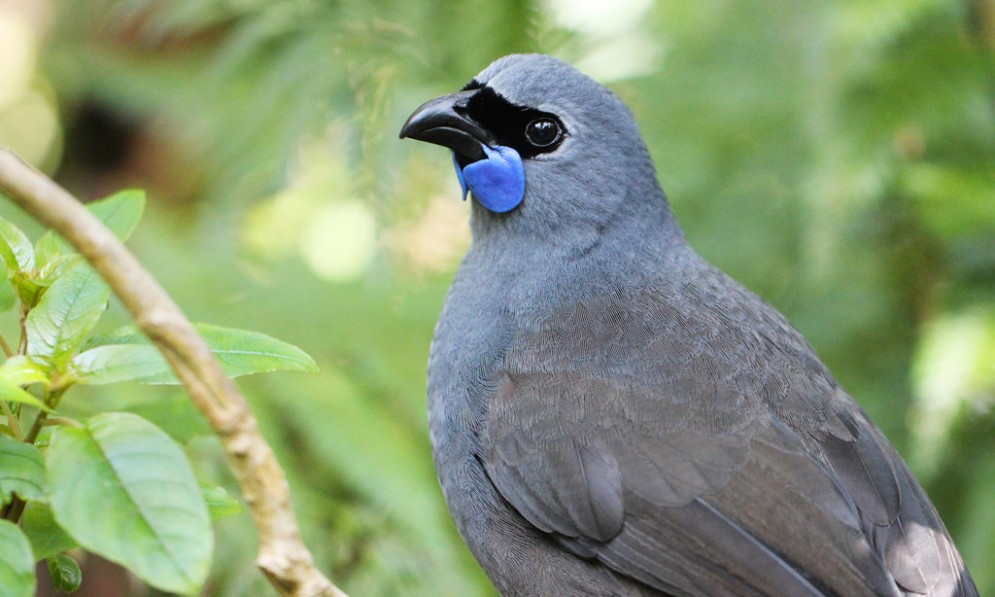The Kōkako has been crowned New Zealand's Bird of the Year after two weeks of close competition and heated campaigning.
Best known for its deep organ-like call, the Kōkako is a large slate-grey bird with blue wattles.
Once threatened with extinction there were just 660 Kōkako left in 1999. But today, their numbers have passed 3000 individuals, and populations are recovering thanks to predator control and translocation programmes.
Like many of New Zealand’s native birds, the Kōkako is vulnerable to predation by introduced mammalian predators such as stoats, cats, possums and rats that kill eggs, young birds and adults.
The Kōkako’s successful campaign to win Bird of the Year was led by 16-year-old Oscar Thomas from Auckland, with help from the Rotoehu Ecological Trust in the Bay of Plenty.
“I first got interested in birds after my class visited Tiritiri Matangi Island when I was 10 years old. I didn’t see the Kōkako that day, but it was worth the return trip. It’s haunting call and ghostly appearance has fascinated me ever since” he said.
“It has the most beautiful call of all New Zealand’s birds and it’s the loudest in the forest. It sings with a deep, five-note call that makes the Tūī sound like an elaborate train wreck.”
While most teenagers have their eyes fixed on screens, Oscar can be found looking for birds. He is one of the youngest guides on Tiritiri Matangi, helps run a club for young birders, and has even volunteered to count rare birds on the Chatham Islands.
Oscar hopes the Bird of the Year title will raise awareness for the kōkako and all of New Zealand’s birds, many of which are threatened with extinction.
“I wanted to show people how special all our native birds are and what we stand to lose. 80 per cent of New Zealand’s birds are classified as at risk or threatened and if we don’t do anything to help them, they could be gone forever.”
Bird of the Year is one of Forest & Bird’s most popular annual events. It aims to raise awareness of New Zealand’s unique native birds and the threats they face by asking people to vote for their favourite species. This year saw just under 20,000 people vote for their favourite bird.
The Kea came in second with 2608 votes followed by the Fantail (Pīwakawaka) with 1508 votes.
This is the first time the Kōkako has won the Bird of the Year title - it came second to the Bar-tailed Godwit (Kuaka) in 2015.
Full results
Albatross, 775 votes
Banded Dotterel, 164 votes
Bar Tailed Godwit, 65 votes
Barn Owl, 178 votes
Bellbird (Korimako), 323 votes
Bittern, 158 votes
Black Billed Gull, 86 votes
Black Petrel (Taiko), 68 votes
Blue Duck (Whio), 165 votes
Brown Teal (Pateke), 172 votes
Chatham Island Black Robin, 314 votes
Fairy Tern (Tara Iti), 128 votes
Fantail (Pīwakawaka), 1508 votes
Fernbird (Kotata), 71 votes
Fiordland Crested Penguin (Tawaki), 78 votes
Gannet (Takapu), 108 votes
Grey Warbler (Riroriro), 288 votes
Harrier (Kahu), 250 votes
Hihi (Stitchbird), 243 votes
Hutton’s Shearwater, 67 votes
Kākā, 539 votes
Kākāpō, 654 votes
Kākāriki, 126 votes
Kakī (Black Stilt), 620 votes
Kārearea (New Zealand Falcon), 527 votes
Kea, 2608 votes
Kererū, 511 votes
Kingfisher (Kōtare), 342 votes
Kiwi, 152 votes
Kōkako, 3614 votes
Little Blue Penguin (Kōrora), 190 votes
Mohua, 60 votes
New Zealand Dotterel (Tuturiwhatu), 251 votes
New Zealand Robin (Toutouwai), 205 votes
New Zealand Scaup (Pāpango), 81 votes
Pūkeko, 146 votes
Rifleman (Tītipounamu), 120 votes
Rock Wren, 104 votes
Royal Spoonbill, 165 votes
Ruru (Morepork), 900 votes
Saddleback (Tieke), 336 votes
Shag, 49 votes
Shining Cuckoo, 73 votes
Shore Plover (Tūturuatu), 47 votes
Sooty Shearwater, 493 votes
Southern Rockhopper Penguin, 97 votes
Spur-Winged Plover, 38 votes
Takahē, 187 votes
Tomtit, 145 votes
Tūī, 597 votes
Weka, 242 votes
White Faced Heron, 55 votes
Wrybill, 69 votes
Yellow Eyed Penguin (Hoiho), 139 votes

